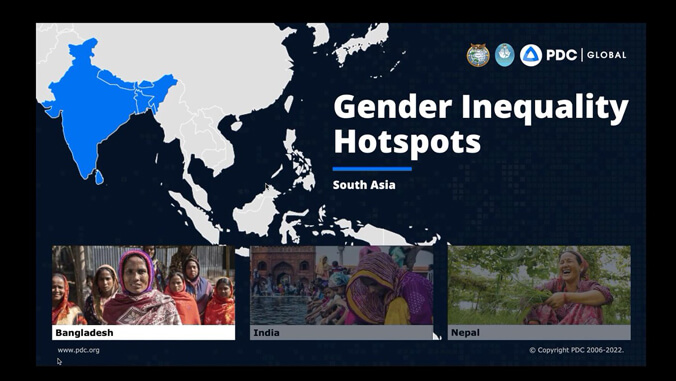
The first analysis of gender trends across the globe and in the Indo-Pacific region, has been developed by the University of Hawaiʻi’s Pacific Disaster Center (PDC) in partnership with the U.S. Indo-Pacific Command (USINDOPACOM)’s Office of Women, Peace and Security (WPS).
PDC shared the results of the year-long collaborative research effort—analyzing all available data related to women, peace and security—in two virtual working sessions in April. The sessions helped stakeholders understand the drivers of gender inequality and how the WPS analysis can enhance programmatic efforts to improve gender-based resilience, peace and security around the globe.
This is not only informative, but transformative.
—Christopher Robson
Participants from across the Indo-Pacific were welcomed by Air Commodore Christopher Robson, USINDOPACOM’s regional and multinational engagement advisor for strategic planning and policy, who described the recent U.S. Department of Defense (DoD) requirements to integrate gender analysis into security cooperation planning and processes.
“This is not only informative, but transformative,” said Robson. “This is the first time that the DoD has commissioned a research project for an accurate picture of current gender trends across the globe, with a focus on the INDOPACOM region.”
Analysis provides significant data
WPS Analyst Dee Sawyers highlighted the significance of the first composite-index, data-driven gender responsiveness baseline assessment.
“The body of work provides key indicators of destabilizing factors identified in previous human security research products within organizations such as the United Nations, USAID (U.S. Agency for International Development) and the Red Cross,” Sawyers said. “The baseline assessment analysis is a planning tool for practitioners—adding clarity to and reinforcing DoD policies such as the U.S. strategy to prevent conflict and promote stability.”
The methodology and regional results were presented by PDC’s Joseph Green, director of applied science and advanced analytics. He shared how certain indicators, while not often perceived as gender-oriented, can be cross-cutting and impact gender-based security concerns.
PDC has also worked with U.S. Northern Command and U.S. Southern Command for similar assessments in their regions. The UH applied science and research center is committed to ensuring that underrepresented populations are included in analysis across all domains affecting humanitarian assistance, security and disaster risk reduction.

